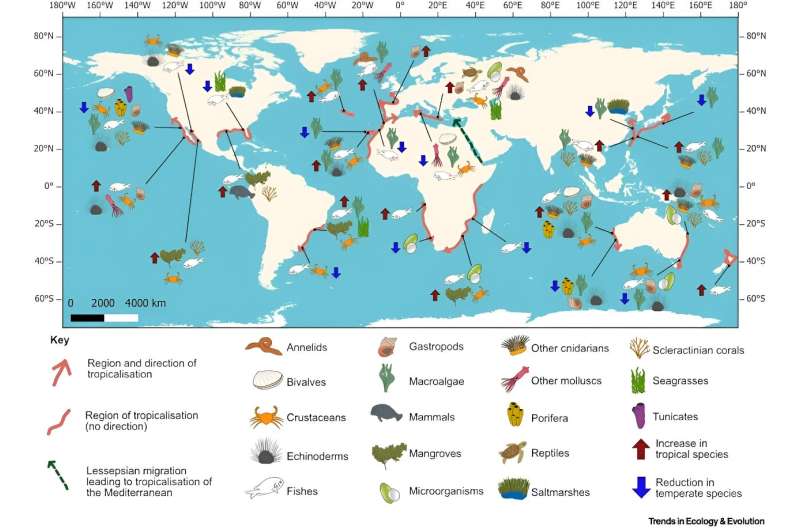As seas get warmer, tropical species are moving further from the equator

Climate change is causing tropical species in the ocean to move from the equator towards the poles, while temperate species recede. This mass movement of marine life, termed , is leading to a cascade of consequences for ecosystems and biodiversity, and has the potential to impact the global economy.
My colleagues and I recently identified and reviewed 215 tropicalization-related scientific papers published between 2003 and 2023. Our work, now published in the journal , reveals the extent of this species movement, and demonstrates just how widespread its consequences can be.
Tropicalization is a global trend, fueled by climate change-induced increases in sea temperatures and . It is particularly apparent in the regions where strong currents . For example, the Kuroshio Current in the Western Pacific has helped certain to move from the tropics into temperate Japanese waters.
However, other regions of the world where such currents are absent can also experience tropicalization. A notable example is expanding northward along the coast of Florida as winter temperatures rise. These trees are typically sensitive to freezing conditions, but can now survive at higher latitudes, where they are replacing salt marshes.
Marine life on the move
Tropicalization involves a wide range of marine life from large habitat forming groups such as corals, algae or mangrove trees, through to marine snails, reptiles and even mammals, among many others. Nevertheless, species involved tend to have some things in common.
Those which are able to move into warming seas such as some or are good dispersers, typically able to travel further in search of suitable habitat. Simultaneously, tropical species that are more generalist in what they eat and how they behave can perform better in their new range. For example, are more successful at establishing in the new range as they are more likely to find a source of food.
Ecological and evolutionary consequences
Tropicalization can impact an individual population, a whole species or even entire ecosystems. For example, as herbivorous fishes move away from the equator they they find in their new home. This creates additional space for corals to settle in the area, contributing to further Tropicalization. And as (a cousin of the manatee) expand southwards along Australia's west coast, they are expected to greatly increase the pressure on already vulnerable seagrass meadows through their consumption.
Some animals are adapting their behavior. For instance, as tropical damselfishes go further from the equator along south-eastern Australia, they start instead of sticking to their usual groups of tropical peers. This change in behavior is thought to be linked to them .
Recent investigations have just begun to unveil the genetic and evolutionary consequences of Tropicalization. For instance, if that may lead to a , which can leave the population less able to adapt to future changes. Meanwhile, some temperate species are already adapting to new tropical neighbors. For instance, volcano barnacles in temperate waters off Baja California, Mexico have been observed "" to fend off tropical predatory snails.
The socio-economic consequences
Whether the consequences of Tropicalization are positive or negative will depend on the geographic region and the stakeholders in question. The widespread movement of marine life is already impacting global fisheries, with regions like the western Pacific Ocean experiencing . However, Tropicalization is also leading to a temperate species and an increase in .
Meanwhile, the proliferation of mangrove trees contributes to enhanced , compared to the temperate saltmarshes they replace. And the expansion of charismatic tropical species such as corals and the colorful marine life which they host, could help local economies through .
As the latest UN climate summit unfolds, our changing climate means we urgently need more investigations into Tropicalization and better-informed actions to deal with it. While existing research sheds light on its ecological impacts, significant gaps persist in understanding its evolutionary consequences and their interplay with complex socioeconomic impacts. Tropicalization is a worldwide phenomenon happening right now, and it demands our attention.
Journal information: Trends in Ecology and Evolution
Provided by The Conversation
This article is republished from under a Creative Commons license. Read the .![]()



















